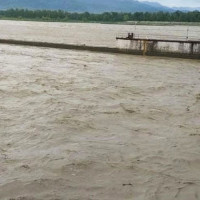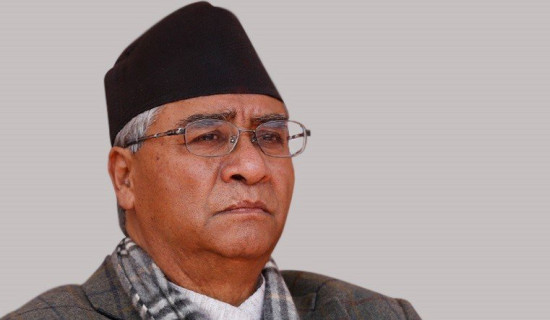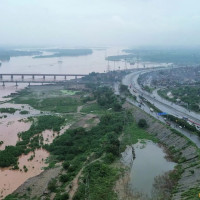- Friday, 29 August 2025
Development displaces village ponds
By Toplal Aryal,Resunga, Aug. 29: There used to be a large pond in Jaisithok, Dhurkot Rural Municipality-4, known as Kalapokhara. In the past, many villages in the highlands suffered from a lack of water, forcing generations to carry water from wells and springs. For those who had many cattle, Kalapokhara was a great relief, as it supplied water all the year round.
With the introduction of a lift system, water from rivers is now pumped to highlands, which has eased the shortage of drinking water to some extent. Had the local ponds been preserved, they would have been a reliable source of water for the locals.
According to local Shovakhar Pokhrel, 84, Kalapokhara had water throughout the year and was used to quench the thirst of livestock across the village.
But after 2013, the pond was filled with concrete and mud to build a playground.
Similarly, there was another pond in Jaisithok called Golpokhari. It was restored in the mid-1990s but gradually dried up and is now in ruins, Pokhrel said.
In Malika Rural Municipality-6, Arje, there was once a pond known as Jorte Pokhara. With the expansion of roads, it has now completely disappeared. In Lamidanda of Resunga Municipality-5, there used to be a big pond, so the place was also called Thulopokhara. "Once a water-rich pond, which also hosted fairs during the Dashain festival, was buried during road expansion," said locals.
The Dhakrepani Pauwa Pokhari in Musikot Municipality-2 and Sauka Pokhari in Budathok have also vanished due to road construction. Likewise, in Naya Pokhara, Isma Rural Municipality-3, a big pond was lost in the process of expanding the road, ward chairperson Jyotiraj Kunwar said.
Nara Bahadur Budhathoki, Chair of Bharse Youth Club and caretaker of Thulopokhari, said around Rs. 2 million has been spent so far to carry out pond conservation efforts. However, it still cannot hold water throughout the year.
Bharat Sapkota, Chief Engineer at the Water Resources and Irrigation Division Office in Gulmi, said that efforts for pond conservation carried out in the district are not satisfactory. “We work on only two to three ponds in a year,” he said.
He stressed that ponds are important not only for the environment but also for livestock, wildlife and irrigation, and therefore need to be protected.








-square-thumb.jpg)







